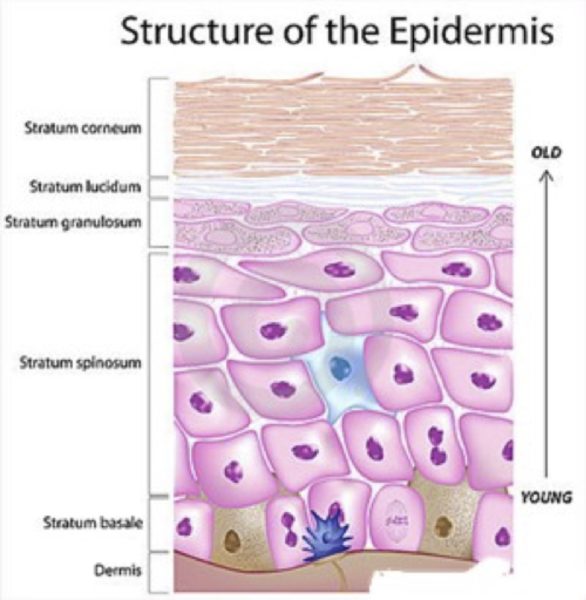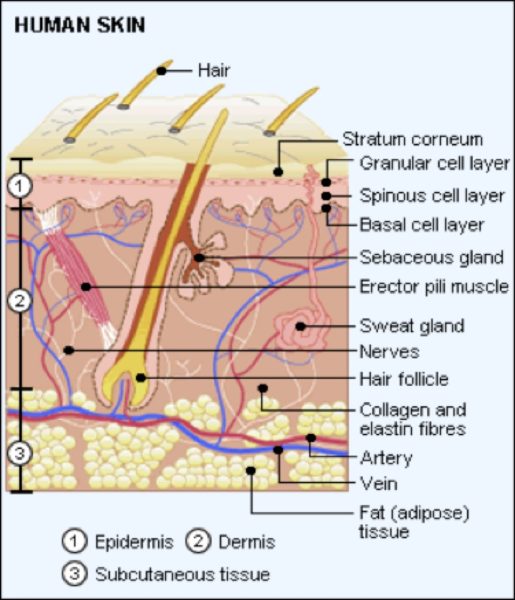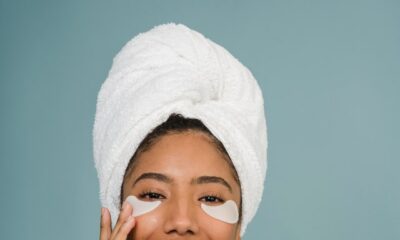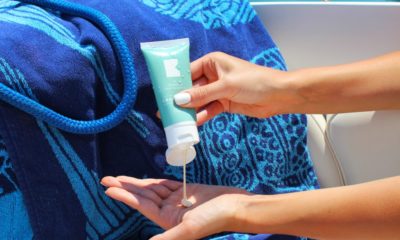Features
Love Your Skin with Ebele Ugochukwu: Everything You Need to Know About Exfoliation
 Exfoliation is the process of removing the top layer of your skin either mechanically or chemically.
Exfoliation is the process of removing the top layer of your skin either mechanically or chemically.
Our cells are in a constant state of renewal; from new cells to old then they die are eventually shed. Without proper exfoliation, these dead cells can accumulate on the skin surface not only creating a dull lack lustre quality to the skin, it can also trap dirt and debris in between. It is essential to remove this dead cell layer regularly to allow new healthy cells to rise to the surface thereby giving the skin a health glow and natural radiance.
Human skin is made up of an upper layer called the Epidermis and a lower deeper layer called the Dermis.
The new younger cells are below and the older dying cells are above. So the idea is to ensure that the new cells rise to the top regularly with no impediment.
Mechanical exfoliation is achieved by applying a mildly abrasive agent to the skin in a regular, rhythmic pattern for about 90seconds or more. This type of preparation is commonly referred to as a scrub; abrasive agents used include sugar, salt, crushed almond or walnut shells, coffee grounds and jojoba beads to name just a few. Mechanical exfoliation can also be achieved to some extent with brushes, special sponges and other electronic devices.
Chemical exfoliation is using a mildly corrosive agent to melt off the top layer of the skin by breaking down the bonds between the cells. Alpha hydroxyl acids (AHA) (these include glycolic acid, lactic acid, citric acid, mandelic acid) are most commonly used for exfoliating creams. Other exfoliating chemicals include Beta hydroxyl acids (BHA), enzymes and Retinol.
So to put it simply mechanical exfoliators scrub/scrape off while mechanical exfoliators melt off.
It has always been widely advised to exfoliate 2-3times per week however, it is more than likely that the main target of that message is the Caucasians; indeed, majority of the skin care resources available are referring to Caucasian skin.
To better understand why the needs of Caucasian skin and skin of colour differ, it is important to highlight a few differences between these two skin types.
Scientists have discovered structural differences in Black, White and Asian skin in terms of thickness, water content and lipids.
In order not to get to too technical, I will mention the major differences;
• The Stratum corner of Black skin has more layers and stronger cells than in white skin.
• The epidermis of black skin contains less glutathione (a co-enzyme involved in intracellular oxidation reduction reactions). Inhibition of epidermal glutathione system leads to darker skin and the presence of glutathione leads to inhibition of melanogenesis (production of the pigment melanin which gives skin its colour.
• Black skin has larger melanosomes (melanin producing cells) than white skin.
• Black skin has a higher electrical resistance than white skin which suggest greater thickness and cohesion.
• Black skin has larger and multinucleate fibroblasts (a cell in found in connective tissue which produces collagen and other fibres) which is the reason we are more prone to scarring and post inflammatory hyperpigmentation.
• Black skin and Asian skin have thicker and more compact Dermis which is the reason we have fewer wrinkles as we age.
• Black skin has larger mast cell granules (cells that gather at the site of inflammation to begin the healing process) than white skin. This is also why we are more prone to keloid formation.
• Black skin sheds its outer layers more frequently than white skin.
Please note that anywhere you see the term ‘black skin’ it is not referring to dark complexioned people but instead referring to every human being of African Descent originally irrespective of whether you are fair, medium or even mulatto.
It is quite obvious that the care of black skin versus white needs to be a bit different to cater for each specific skin care requirement.
For black skin the most important routine is EXFOLIATION. From the above you can see that not only is black skin thicker, it also desquamates (cell turnover) more frequently. Black skin can be scrubbed daily without any adverse effects due to the reasons already mentioned. However, you must be careful about the scrub you use.
Second to drinking water, exfoliation is the most important thing for maintaining good skin for people of colour.
Daily Exfoliation will make your skin smoother, fairer, brighter, softer.
Imagine a carpenter with a piece of wood, the more he sand papers it, the smoother and lighter it becomes.
It is best to combine both chemical and mechanical exfoliation to get the best results. And alpha hydroxyl acids are also excellent for maintaining the youthfulness of your skin.
Please note that it is not every scrub that can be used daily. For example, the crushed almond or walnut shells used in Apricot facial scrub is not for daily use. The shells can cause micro cuts on the skin surface, Note also that it is inadvisable to use body scrubs on your face. Facial scrubs are specially formulated because the face has special needs when compared to the rest of your body.
Good examples of daily facial scrub in no particular order include;
• Dermalogica daily exfoliant
• Aveeno Radiant skin brightening daily scrub
• Olay skin smoothing cream scrub
• S.Studio ‘Scrub Away My Troubles’ daily scrub (the range also includes excellent chemical exfoliating lotion)
• Murad AHA/BHA Exfoliating cleanser
• Neutrogena Pore Refining exfoliating cleanser
• The Body Shop Aloe Gentle Exfoliator
• Biore free your pores pore unclogging scrub.
You can augment the effect by using any exfoliating cream of your choice; just look out in the ingredients for Alpha hydroxyl acid AHA or beta hydroxyl acid BHA or retinol.
Please note the following when using any kind of chemical exfoliating lotion/cream;
• Product is best applied only at night.
• you have to avoid the sun as much as possible
• be disciplined with your use of sun screen daily
• Always let your facial therapist know especially with the use of retinol; she has to be extra cautious during treatments.
If you’re not a skinaholic, the least you can do is exfoliate daily, drink a lot of water and use your sunscreen.
For my fellow skinaholics, I know I don’t need to tell you twice, adjust your game if you need to.
Till next time, keep putting your best face forward!























